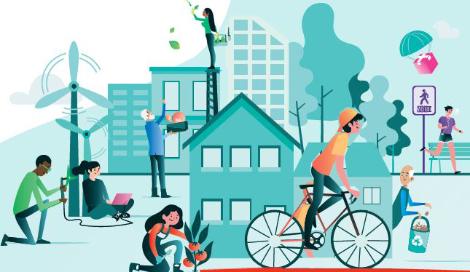Tomorrow my territory 19 Organizing or supporting eco-responsible events
Eco-responsible events
November 2019
Agence pour l’Environnement et la Maîtrise de l’Energie (ADEME)
The 20 factsheets in the collection « demain MON TERRITOIRE » have been designed to give candidates and elected officials practical keys to take action, to open up the field of possibilities based on the experiences of other elected officials, from small towns to conurbations, large urban areas or sparsely populated areas. In the four corners of France, both in metropolitan France and in the French Overseas Territories, many of them are taking action, together with the players in their territories, to prepare for the future by taking action to mitigate climate change and adapt to its effects. With its knowledge and presence throughout the country, ADEME supports them with its tools, activities and financial aid.

Why make events more environmentally friendly?
Any event (fair, fairground, exhibition, conference…) is by nature ephemeral and generates negative impacts on the environment, punctual but acute: paper consumption, transport, energy, waste production… Any event can be revisited in order to reduce its environmental impacts and avoid certain disastrous images (overflowing garbage cans, unsorted waste…), in complete opposition to the daily actions of the territory. On the other hand, acting upstream by eco-designing an event enables the company to strengthen its own sustainable development approach and to meet the growing expectations of participants in terms of ecological best practices. At the territorial level, it is therefore an opportunity to concretely apply its environmental policies and to show the coherence between its ambitions and its actions in the events it organises or supports.
How do you do it?
-
One chooses a location that is accessible by public transport, close to the expected public, and ideally already has the necessary infrastructure .
-
We limit paper communication (sending e-mails, displaying paper in prominent places rather than individual distribution, etc.) and print press kits or other documents on both sides of the page on paper that meets the requirements of the European eco-label or equivalent, reducing the weight and favouring a condensed graphic design to limit empty spaces and flat areas of colour.
-
Special papers - especially metallized ones - and laminations are avoided (as many chemicals and obstacles to recycling are avoided!). We promote the use of available public transport, encourage carpooling, and offer preferential rates for entry to the event upon presentation of the public transport ticket.
-
Environmental criteria are integrated into the choice of technical services (modular, dismountable and reusable stands, food from organic farming, energy-efficient lighting, dry toilets, etc.).
-
We are doing away with the disposable, relying on renewable resources and promoting recycling. We avoid promotional items and other gadgets!
-
A system of reusable, returnable cups is being implemented.
-
Containers for the selective collection and sorting of waste are installed and it is ensured that the sorted waste is actually recovered/recycled.
-
We communicate on the process and raise awareness among participants and stakeholders so that they have the right reflexes (waste sorting, fight against food waste, etc.).
-
After the event, we draw up a report and draw up suggestions for improvement for the future.
-
Environmental conditions are set for events that are subsidised (removal of disposable products, installation of waste sorting equipment, site clean-up, etc.).